Have you ever wondered, as most people do, how to increase health span and improve longevity? If so, you’ve come to the right place because we’ll give you all the latest information on NAD, a molecule that could be vital to you aging well and living a longer, more vigorous life.
Emerging scientific evidence has reported that the naturally occurring coenzyme NAD, Nicotinamide Adenine Dinucleotide, or NAD+ (the oxidized form) may significantly slow the rate at which human cells age.
In fact, professional researchers conducting a clinical review in Japan concluded, “NAD is a critical regulator of aging and longevity” and “several studies have clearly shown that genetic or nutritional activation of NAD metabolism promotes lifespan extension.”
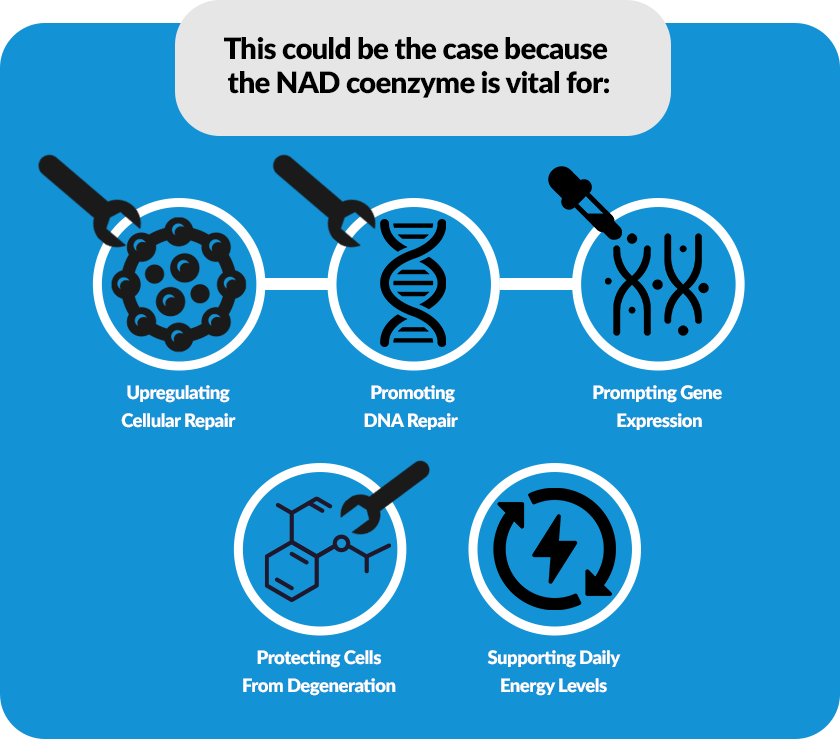
The problem is as we age, our natural stores and ongoing production of NAD decline substantially. A study performed by researchers associated with the University of Minnesota Medical School noted that human NAD+ levels could fall by as much as 50% by middle age.
As scientific studies become increasingly available, NAD continues to gain traction as a potential game-changer for aging, and many scientists, as well as medical professionals, have already gotten on board.
In this article, we’ll describe precisely what NAD is, how it affects aging, and how naturally stimulating growth in your NAD levels could be crucial for you to increase your health span and improve longevity.
Plus, we’ll wrap things up by giving you some “tried and true” tips on maximizing your NAD levels now and into the future.
What Exactly is NAD and Why Does it Matter For Longevity?
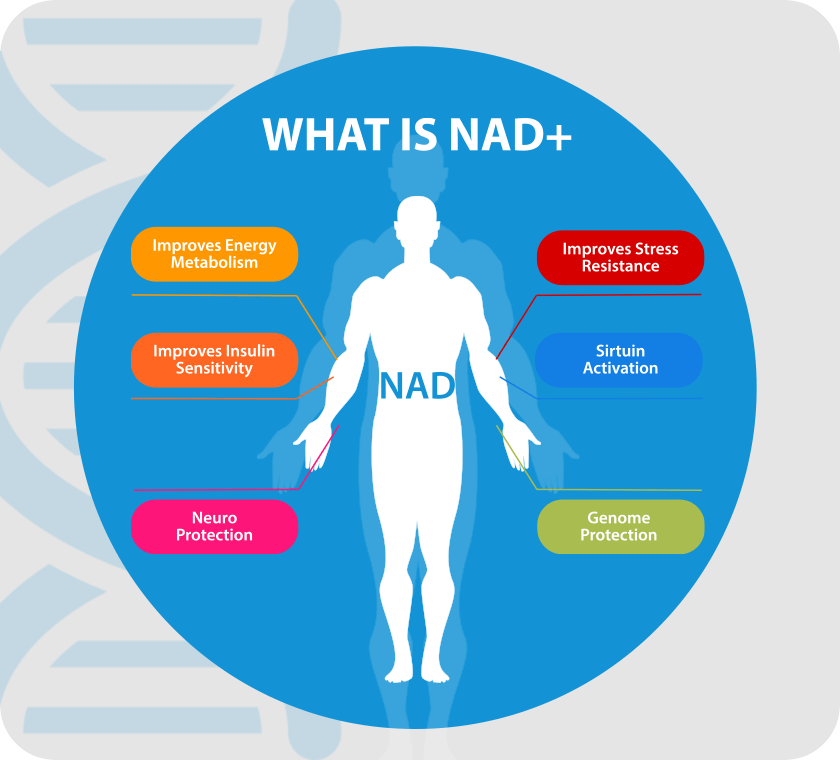
NAD, or Nicotinamide Adenine Dinucleotide, is a life-giving coenzyme found in all of nature’s living cells, from unicellular organisms like bacteria to advanced life forms like humans. It plays a pivotal role in the biochemical reactions that power our cells and sustain life on a daily basis.
The mysterious molecule was first noticed by scientists in the early 1900s. At that time, British biochemists were studying yeast and how it induced fermentation, attempting to understand the mechanics behind it all.
The revolutionary study (for its time) showed that some yeast compounds stimulated fermentation better than others under extreme conditions, like intense heat.
Later, leading researchers Arthur Harden and William John Young surmised the more productive yeast elements must contain something that the less productive yeast didn’t. That turned out to be a more considerable amount of NAD.
Without fully knowing it, these men had stumbled upon a massive discovery. The science behind NAD has continued to slowly develop since then, with an enormous boom in information growth over the last 10-15 years or so.
You see, fermentation is quite similar to aspects of human metabolic operations and other physiological processes at a molecular level. So, in much the same way that NAD was powering more efficient fermentation, it can also power more efficient metabolic wellness and promote other health benefits in people.
The NAD coenzyme is also essential for the following health and wellness factors:
Mitochondrial Wellness
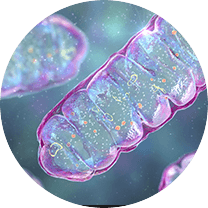
Mitochondria are organelles found in most human cells that act like tiny “power plants” because they supply the energy needed for cellular activity. Simply put, without healthy mitochondria operating like a “well-oiled machine,” human life wouldn’t work at a cellular level.
During cellular respiration, when your cells convert nutrients into usable energy, NAD facilitates the transfer of electrons within mitochondria. This transfer of electrons is what fuels the mitochondria that power your cells.
Before we get too much further “into the weeds,” it would be fair just to say that without adequate NAD levels, cellular respiration and, therefore, cellular wellness can decline substantially.
Proper Circadian Rhythm
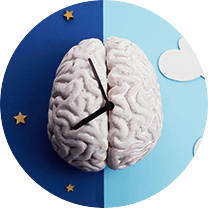
A 2023 Swiss study stated, “Nicotinamide Adenine Dinucleotide (NAD) plays a central role in the master circadian clock of the brain.”
As you may know, your circadian rhythm amounts to the “internal clock” that all of your bodily processes work on. It can heavily affect your sleep-wake cycle, mood, energy levels, cognitive performance, hormone production, metabolic efficiency, immune system capacity, hunger cravings, and more.
Modern scientific evidence suggests that your body needs adequate NAD levels to carry out the enzymatic reactions that produce the proteins required to regulate your circadian rhythm.
And while that’s a bit of a mouthful, all it really means is that the biochemical reactions that regulate your circadian rhythm need NAD as a type of “raw material” in the same way an automobile needs oil to run.
Sirtuin Synthesis
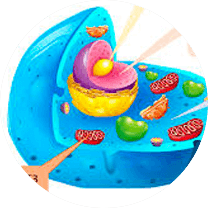
Sirtuins are a class of proteins that modulate the aging process and life cycles of cells throughout the human body while also hugely influencing cellular stress responses.
NAD is a necessary coenzyme that must be abundantly present for the enzymatic reactions that synthesize sirtuins. Without NAD or substantially reduced NAD levels, these reactions either don’t happen or happen very inefficiently.
This was underscored in a clinical review performed by researchers associated with Harvard Medical School, who noted that utilizing sirtuin activators, mainly NAD+ (the oxidized form of NAD), can delay the onset of age-related issues and “extend lifespan” in mammalian cells.
Sirtuins are a class of proteins that modulate the aging process and life cycles of cells throughout the human body while also hugely influencing cellular stress responses.
NAD is a necessary coenzyme that must be abundantly present for the enzymatic reactions that synthesize sirtuins. Without NAD or substantially reduced NAD levels, these reactions either don’t happen or happen very inefficiently.
This was underscored in a clinical review performed by researchers associated with Harvard Medical School, who noted that utilizing sirtuin activators, mainly NAD+ (the oxidized form of NAD), can delay the onset of age-related issues and “extend lifespan” in mammalian cells.
Why We Age at a Cellular Level
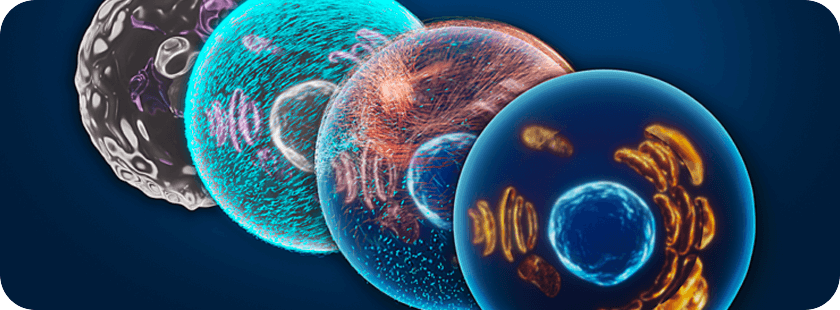
The unrelenting desire to increase health span and improve longevity has always been firmly rooted within the human psyche. That’s why countless explorers risked life and limb seeking the mythical “fountain of youth,” only to be greatly disappointed when they discovered it did not exist.
However, despite the failed searching, unabating pain, and sadness caused to billions of people by the aging process, it wasn’t until recently that we seriously began to study how aging happens at a molecular level.
Throughout the 20th and early 21st centuries, more and more evidence emerged on why we age and why our cellular wellness degrades over time.
Here, we’ll discuss several major contributing factors to the typical age-related decline we all experience at a molecular level.
Mitochondrial Impairment
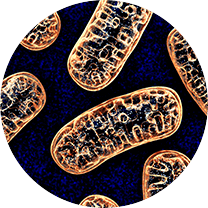
As stated above, mitochondria are like “power plants” that provide ample energy for cells to operate at a normal capacity.
However, as we age, our mitochondria become more susceptible to damage, which can severely hamper the efficiency with which they operate.
This degradation can be induced by several factors, such as damage to mitochondrial DNA, a reduced capacity for replacing old or mutated mitochondria, and, of course, NAD decline.
As your mitochondria operate worse and worse over the years, so too will most cells in your body. To repeat a cliché, it’s like trying to drive a car with no oil.
DNA Damage
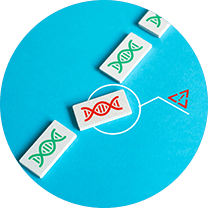
DNA is commonly damaged during the lifecycle of a cell. However, as we get into our 40s, 50s, 60s, and beyond, it can be far more difficult for our bodies to correct these issues.
DNA damage can occur from ingesting too many toxins or harmful chemicals, exposure to ultraviolet light or radiation, and oxidative stress, among other causes.
Additionally, the loss of NAD and the subsequent reduced viability of sirtuins, which rely on NAD to operate, also contribute to age-induced DNA damage.
Maintaining healthy DNA is vital to long-term health and the avoidance of potentially serious health problems.
However, in many cases, this is easier said than done, as DNA damage and aging generally occur together.
Oxidative Stress
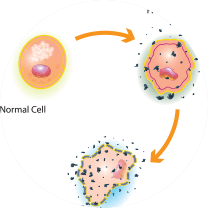
Oxidative stress occurs when molecules known as free radicals accumulate and cannot be adequately expelled from cells, resulting in a potentially harmful situation.
Oxidative stress is normal, but excessive levels, which often occur as we age, can harm multiple facets of health and cellular wellness.
Over time, growing oxidative stress may lead to the deterioration of cellular tissue, further DNA damage, chronic inflammation, and even worse health complications.
Like much age-related cellular decline, oxidative stress is also related to NAD decline. A significant portion of the enzymes needed to react appropriately to cellular oxidative stress depend on adequate NAD levels.
Therefore, as our NAD numbers decline, the processes our cells utilize to mitigate oxidative stress become less efficient.
Shortened Telomeres
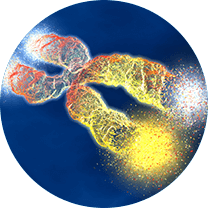
If you, like so many people, haven’t heard of a telomere or are having vague flashbacks to your high school biology class hearing the word, we don’t blame you.
That said, telomeres are essential to chromosomal wellness, especially as one ages. They act as a protective system for chromosomes and are found on the tail ends of string-like chromosomal structures, which safeguard DNA and express genomic signals.
As cells divide repeatedly, their telomeres become increasingly shorter. When they become too short, cells begin to deteriorate or even die.
An animal study conducted by researchers in the United Kingdom found a significant correlation between telomere length and lifespan.
NAD coenzymes are needed to stimulate the biochemical reactions that can maintain and protect telomeres from rapid shortening, which tends to occur in older people.
Lowered NAD Levels

If you’ve read closely, you’ve probably noticed that lowered NAD levels can massively impact several aspects of declining cellular wellness and increase the likelihood of subsequent negative age-related outcomes.
This is generally true because NAD is a vital coenzyme and perhaps one of the most essential compounds in the human body, as it’s necessary for hundreds of biochemical reactions that make human life and peak cellular efficiency possible.
As we get older, we experience a long list of NAD-lowering phenomena, including reduced NAD synthesis, increased internal NAD usage, increased oxidative stress, and others.
Lifestyle factors, body composition, and diet can also affect our NAD levels, something we’ll cover in depth later in this article.
How Ample NAD Levels Can Improve Longevity and Increase Health Span
As mentioned, a wealth of emerging evidence is reporting that maintaining or potentially improving NAD levels can help you to look, feel, and think younger, even as you reach your 50s, 60s, 70s, and beyond.
A study of human cells taken from 49 volunteers conducted by researchers associated with the University of New South Wales in Australia concluded by stating, “The observed correlation between NAD+ levels and aging adds weight to the idea that NAD+ may play a role in cell senescence and longevity and not simply as an electron carrier.”
This is just one of the many studies that have reported similar, highly intriguing findings.
But how exactly does having ample NAD levels inside of your cells help you to improve longevity and increase your health span?
Let’s look at some examples of the compelling anti-aging benefits driving the widespread interest in NAD’s anti-aging properties.
These are expected benefits adequate NAD levels can offer.
Benefit #1 – Promotes Enzymatic Activity
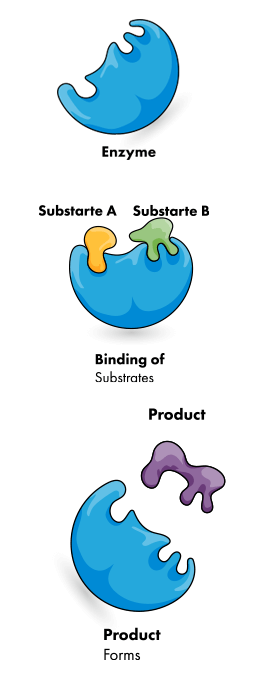
As a vital coenzyme, NAD is necessary to activate critical enzymes, including sirtuins and poly-ADP ribose polymerases (PARP). Both enzymes play essential roles in maintaining cellular integrity and reducing adverse outcomes related to aging.
More specifically, PARP and sirtuin promote healthy DNA repair and gene expression. However, as NAD levels decline, the efficiency of these enzymes can be tainted, resulting in potentially dire long-term health issues.
A study published by researchers associated with the Washington University School of Medicine stated NAD “plays an important role in the regulation of NAD+-consuming enzymes, including sirtuins, poly-ADP-ribose polymerases (PARPs), and CD38/157”.
(CD38/157 is another enzyme that relies on NAD-dependant biochemical reactions.)
Taking steps to maintain and build greater NAD levels will help activate more of these life-supporting enzymes, resulting in even better cellular health and more graceful aging.
Benefit #2 – Enhances Chromosomal Stability
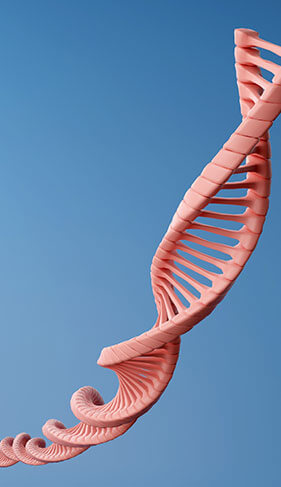
As discussed above, NAD is needed to help maintain healthy telomere length in chromosomes. Telomere length is an established longevity marker and can be highly indicative of the length of life for some organisms.
Chromosomes are complex structures that store DNA and transmit genomic data from cell to cell. They’re needed for proper cell division, repair, and regeneration.
However, with age, chromosomes tend to break down and make errors in gene expression, increasing the chances of related health issues.
A study published in Cell Cycle reported that when NAD-dependant enzymes experience reduced activity, chromosomal structure can suffer and harm cell regeneration.
However, acting to improve your NAD levels should help you maintain healthy chromosomal stability, effectively reducing some negative outcomes related to aging.
Benefit #3 – Amplifies Cellular Energy
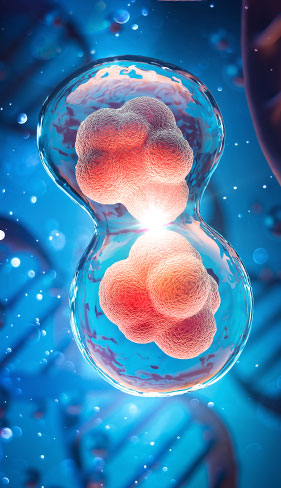
Cellular energy production declines massively with age due to factors such as mitochondrial damage, accumulated oxidative stress, reduced organelle regeneration, and declining NAD.
Lowered cellular energy levels may contribute to multiple age-related problems, including reduced cognition, decreased physical endurance, and a greater likelihood of other ailments.
Adenosine triphosphate (ATP) is the primary compound used for fueling energy at a cellular level.
And guess what?
Your cells need NAD every step of the way during the formation of ATP.
A 2020 study published in Aging Neuroscience concluded that brain NAD levels were positively correlated with ATP levels and energy production.
So, it’s no stretch to say that adequate NAD levels can help to ensure high levels of cellular energy, a significant factor in promoting a greater quality of life in older individuals.
Benefit #4 – Supports Immune Cell Signaling
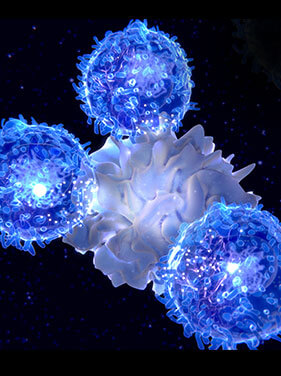
It’s no secret that the older we get, the more susceptible we become to sickness.
But why is that exactly?
Well, there can be several reasons, depending on individual situations. However, one universal contributor is the decline in NAD we all experience.
A 2022 paper published in Current Developments in Nutrition said, “Studies have demonstrated that disruptions in NAD metabolism are associated with impaired immune function and inflammation”.
Ultimately, this decline in immune efficiency may result from lowered mitochondrial wellness and reduced energy efficiency inside immune system cells.
The good news is taking measures to upgrade NAD biosynthesis for yourself could help to reverse these problems.
Benefit #5 – Assists With Neuroprotection
and Brain Wellness

Neuronal degradation and subsequent declines in brain wellness have traditionally been considered an unavoidable outcome of aging by many.
However, recent evidence has supported NAD protecting neuronal homeostasis, potentially boosting human brain wellness.
A 2018 study conducted by researchers affiliated with the Washington University School of Medicine of older lab mice noted that NAD reduction in the animal’s brains contributed to age-associated cognitive decline, but this could be avoided by enhancing NAD levels in the subjects.
While it’s not a human study, this exciting information still shows significant reason to believe NAD could have impactful uses for protecting against neuronal deterioration in humans, an idea that many scientists agree with.
Since NAD is vital to cell wellness throughout the body, it stands to reason that it may also play a crucial role in brain wellness and cognition.
How You Can Increase NAD Levels For Greater Health and Longevity

Now that we’ve done a relative “deep dive” into what NAD is, how we age at a cellular level, and how NAD affects all of this, it’s time to answer the questions on everyone’s minds.
How can you increase your NAD levels for greater health and longevity? Is it even possible? And if so, can anyone do it?
The good news is that the answer to these questions is a definitive yes, yes, and yes.
It’s quite possible to naturally enhance NAD levels by making lifestyle changes or utilizing an all-natural NAD support supplement.
So, let’s discuss some ways you can get your NAD levels where they need to be, allowing you to age as gracefully and beautifully as possible with robust vigor and excellent quality of life.
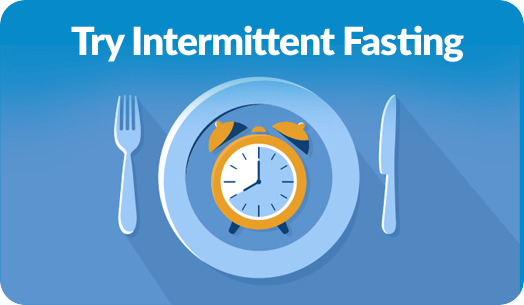
You may have heard of friends who fast or refrain from eating for several hours or even a day or two.
Have you ever wondered why they’d do that?
In some cases, they may be chasing NAD growth because scientific evidence suggests regularly engaging in fasting can stimulate NAD biosynthesis.
A Japanese study looking at lab mice found that when mice were not fed for 24 hours, they showed increased NAD+ and sirtuin activity.
It’s believed that fasting, or calorie restriction, can activate pathways for NAD biosynthesis and increase NAD-dependent enzyme activity.
There are various forms of intermittent fasting, such as “alternate day fasting” or the “16/8 method.” If you’re interested in intermittent fasting, discuss your options with a nutritional professional before establishing a routine.
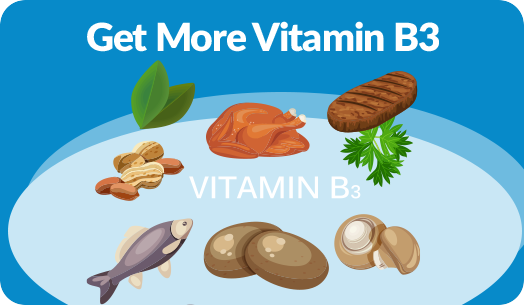
Vitamin B3, also known as niacin, is a precursor to NAD in the human body. Regularly consuming more of this nutrient will likely increase NAD levels over the long term.
When your body metabolizes the vitamin B3 you eat, it’s converted into nicotinamide, a key element needed for the biosynthesis of NAD.
Vitamin B3 is highly concentrated in foods like these:
- Chicken, Turkey, and Pork
- Fatty Fish (Salmon and Tuna)
- Lentils, Chickpeas, and Black Beans
- Green Vegetables
- Avocado
Try to incorporate more of these foods into your diet regularly. They should help you to boost NAD levels in time.
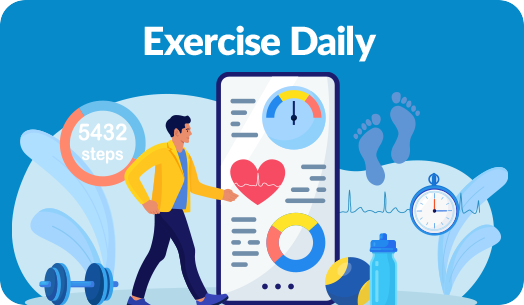
Something as simple as a brisk walk, or if you’d prefer something more intense like running or lifting weights, can help your body produce and maintain greater NAD levels.
Although traditional “cardio,” or aerobic exercises, may be more beneficial for opening NAD biosynthesis pathways.
That’s because regularly straining your body in this capacity naturally increases your cells’ demand for ATP (adenosine triphosphate), the NAD-dependant compound that fuels cellular energy. Your body will naturally produce more NAD to match that growing demand.
Regular exercise can also benefit mitochondrial well-being, enzymatic activity, cellular regeneration, and DNA repair, further lessening the burden on your existing NAD levels.

Chronic stress from work, family, or even your daily commute can wreak havoc on your overall health.
But did you know stress can also damage your NAD levels, potentially causing you to age faster?
When people say the stress is “killing them,” it’s not just hyperbole.
Chronic stress can release stress hormones like cortisol, which, in excess amounts, can quite literally reduce NAD biosynthesis.
Additionally, chronic stress can increase oxidative stress and inflammation, which require the consumption of more of your NAD stores to be corrected.
If you’re overstressed, try some stress-reducing practices like:
- Meditation
- Yoga
- Journaling
- Breathing Exercises
- Reducing Caffeine Intake
- Fun Activities (Fun and Laughter)
Of course, ideally, you should avoid the things that stress you out altogether. However, in many instances, that can be impossible, so practicing stress-reducing activities is a good substitute.

Getting plenty of sleep, generally between 7-9 hours per night, will support optimal NAD levels in the long run.
Returning to the circadian rhythm we discussed above – maintaining a regular healthy sleep cycle puts less stress on your “internal clock.” That lowered stress can reduce your NAD consumption, allowing you to keep more of the NAD you have.
When your sleep schedule is thrown off, more NAD is needed for your circadian rhythm to attempt to correct itself. This can result in massive wastefulness and faster cellular aging.
Plus, most cellular repair occurs at night while you sleep. Sleeping more will also help with mitochondrial efficiency and lowering stress, further reducing NAD consumption.
If you have trouble sleeping, try talking with a sleep expert to understand how you can get a more restful night’s sleep regularly.
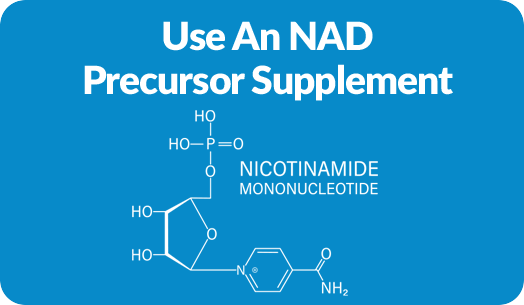
In recent years, as more and more science has come out supporting the anti-aging properties of NAD, some high-quality, all-natural NAD supplements have been developed.
These dietary aids incorporate known NAD precursors, such as NMN (Nicotinamide Mononucleotide), a compound metabolized into NAD in the human body.
Supplementing with NAD itself isn’t feasible because the molecule is unstable and will be broken down before fully absorbed into your bloodstream, where it needs to be utilized by your cells.
Therefore, supplementing with an NAD precursor like NMN should be your best option for all-natural NAD-boosting supplementation.
Of course, not all NMN supplements are created equally. The best NMN supplements usually use highly pure NMN and advanced delivery systems that provide greater bioavailability.
For instance, an NMN supplement with a liposomal delivery system can significantly enhance the rates at which your cells absorb the NMN, likely resulting in much greater NAD biosynthesis.
According to a 2020 clinical review, “Orally administered NMN is quickly synthesized into NAD+”.
How To Increase Health Span And Improve Longevity FAQs
Many people wonder how to increase their health span and improve longevity. Modern science has begun to shed light on NAD and its potential benefits for reducing aging at a cellular level.
The unique liposomal technology allows;
However, many questions remain. We’ll do our best to clarify some of them here.
NAD can affect aging in many ways.
NAD is a coenzyme needed to carry out many enzymatic reactions throughout the human body involving metabolic wellness, immune system efficiency, cognition, and more.
As we age, NAD levels naturally decline, contributing to quicker aging and age-related issues.
Taking measures to stimulate NAD biosynthesis naturally may help you to age at a slower pace biologically.
The unique liposomal technology allows;
Technically, you wouldn’t supplement with NAD compounds but rather an NAD precursor like NMN (Nicotinamide Mononucleotide).
When using high-quality NMN supplements manufactured by reliable companies, you’re unlikely to face any safety issues.
These products have been tested and reported to have no negative side effects.
So, the best NMN supplements, which naturally support NAD biosynthesis, should be completely safe when taken as directed.
NAD and NAD+ are the same molecule, just different forms of that molecule.
NAD+ applies specifically to the oxidized form of NAD. This form of NAD is needed to carry electrons in mitochondria, fueling cellular respiration and other cellular operations.
NAD is a more general term that refers to NAD in all its forms.
There is a third form of NAD called NADH. This molecule form occurs when NAD+ takes an electron from another molecule, which happens during ATP (adenosine triphosphate) production.
We use NAD as a catch-all term to refer to the molecule generally in all its forms.
The unique liposomal technology allows;
Many people will experience declining NAD levels in their early to mid-20s. However, the rate of decline can be affected tremendously by genetics, environmental factors, and lifestyle choices.
The truth is people age at different rates. That’s why some people look great for their age, and others don’t.
In these cases, it’s likely that adequate NAD levels, or a lack thereof, are affecting a person’s biological Aging.
Check out our tips on increasing NAD levels for more excellent health and longevity above to see ways you could maximize NAD levels and age well.
The unique liposomal technology allows;
Emerging science, including studies from some of the most prestigious universities in the world, have reported NAD, or Nicotinamide Adenine Dinucleotide, may be critical to enhancing the human aging experience.
The coenzyme can benefit cells throughout the human body in dynamic ways. The lifestyle choices we make can help us to maximize our NAD levels.
We’re excited to see what future research into NAD may hold – and if you’re interested in living a vibrant, healthy life well into your “senior” years, you should be, too. For the time being, we’re thrilled to see a natural “fountain of youth” may actually exist right here in our own cells.
The unique liposomal technology allows;

